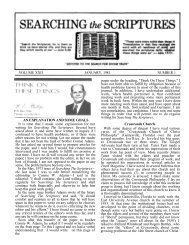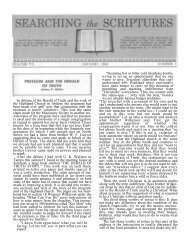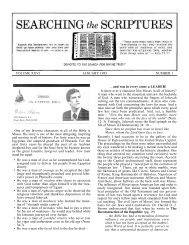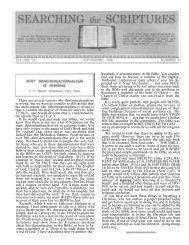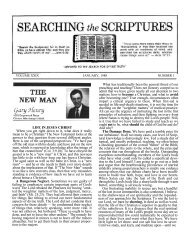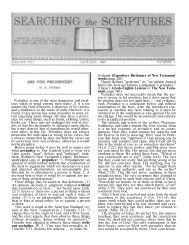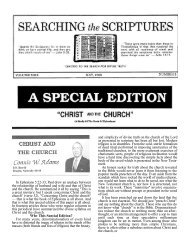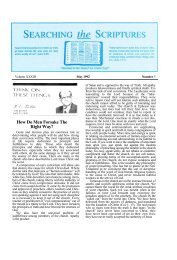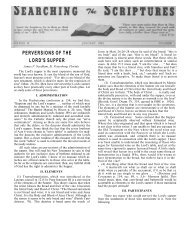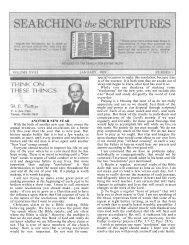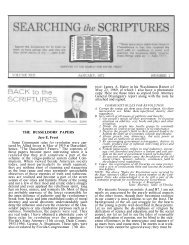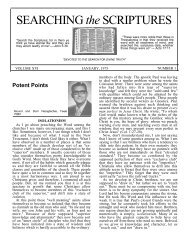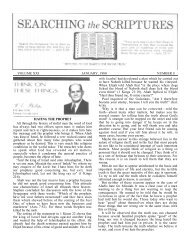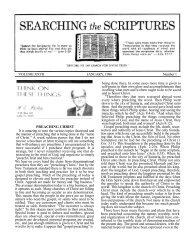Volume 31 – 1990 (PDF) - Searching The Scriptures
Volume 31 – 1990 (PDF) - Searching The Scriptures
Volume 31 – 1990 (PDF) - Searching The Scriptures
Create successful ePaper yourself
Turn your PDF publications into a flip-book with our unique Google optimized e-Paper software.
Page 6 ___________<br />
MARRIAGE OF THE SONS OF GOD TO THE<br />
DAUGHTERS OF MEN<br />
QUESTION: Who are the sons of God and who are<br />
the daughters of men in Genesis 6: 2, 4?<br />
ANSWER: <strong>The</strong> verses state, "That the sons of God<br />
saw the daughters of men that they were fair; and they<br />
took them wives of all which they chose. <strong>The</strong>re were<br />
giants in the earth in those days; and also after that,<br />
when the sons of God came in unto the daughters of<br />
men, and they bare children to them, the same became<br />
mighty men which were of old, men of renown. "<br />
<strong>The</strong> sons of God were apparently the pious descendants<br />
of Seth who married the daughters of men, viz.,<br />
women of the world who lacked spiritual devotion and<br />
piety. Seth was regarded by his mother, Eve, as a son<br />
from God as she said, "For God... hath appointed me<br />
another seed instead of Abel whom Cain slew" (Gen.<br />
4: 25). After the birth of Seth's son, Enos, men (evidently,<br />
descendants of Seth), began "to call upon the<br />
name of the Lord" (Gen. 4: 26).<br />
While the family of Cainites was laying the foundation<br />
for a kingdom of worldly arts and business (Gen.<br />
4: 16-24), the family of Sethites began by united<br />
invocation of the name of God. Hence, the sons of God<br />
would, seemingly, be the Sethites and the daughters<br />
of men appear to be the Cainite women.<br />
A bizarre and fanciful theory is that the sons of God<br />
were angels who took on the form of men and married<br />
earthly women. But Jesus taught that angels do not<br />
marry (Matt. 20: 30; Lk. 20: 35-36). If angels could<br />
have come and married women of this earth, good<br />
angels would not have done so, and bad angels would<br />
not have been called, "the sons of God. " Though<br />
angels are designated "sons of God, " (Job 1: 6; 2: 1; 38:<br />
7), it does not follow that angels are meant in Gen. 6: 2,<br />
4. Adam was "the son of God" (Lk. 3: 38), the Israelites<br />
were "sons of God" (Deut. 14: 1, NASB) and<br />
Christians are "sons of God" (Rom. 8: 14; Gal. 3: 26,<br />
NASB). <strong>The</strong>refore, the descendants of Seth could well<br />
have been "the sons of God. "<br />
Several use Jude, vv. 6 & 7, as a proof-text that<br />
angels were "the sons of God" in Gen. 6: 2, 4. <strong>The</strong><br />
verses read, "And the angels which kept not their own<br />
principality, but left their proper habitation, he hath<br />
kept in everlasting bonds... Even as Sodom and<br />
Gomorrah, and the cities about them, having in like<br />
manner with these given themselves over to<br />
fornication and gone<br />
after strange flesh.... " (ASV).<br />
We are told that "these" in v. 7 modifies "angels" in v.<br />
6. <strong>The</strong> Expositor's Greek Testament states, "the fallen<br />
angels... In the case of the angels the forbidden flesh...<br />
refers to the intercourse with women" (Vol. 5, p. 260). It<br />
is alleged that the pronoun toutois (these) is masculine<br />
gender and Sodom and Gomorrah are neuter and do not<br />
agree in gender. Hence, "these" could not modify Sodom<br />
and Gomorrah, but must refer back to angels.<br />
However, toutois is dative plural of toutos and Moulton<br />
states this pronoun is "masculine and neuter"<br />
(Analytical Greek Lexicon, p. 407), having, therefore, the<br />
same form in both masculine and neuter. Hence, toutois<br />
(these) can modify Sodom and Gomorrah, and the meaning<br />
would be that "the cities about them, " Admah and<br />
Zeboim (Deut. 19: 23; Hosea 11: 8), were sexual<br />
deviants — homosexuals, just like Sodom and Gomorrah.<br />
(Zoar, a fifth city in the vicinity, was spared by the<br />
intercession of Lot (Gen. 19: 21, 22). Where two or<br />
more antecedents are grammatically possible, the<br />
nearer one is selected.<br />
Angels sinned by leaving their habitation. <strong>The</strong>re is<br />
nothing in Jude, or any other place in the Bible about<br />
angels cohabiting with women. <strong>The</strong> offspring of the illassorted<br />
marriages of Gen. 6: 4 became giants, i. e.,<br />
gigantic human beings, men of great renown<br />
physically. <strong>The</strong> word "giants" (Nephilim, ASV) is<br />
obviously used for the offspring of men in Num. 13: 33.<br />
<strong>The</strong> Bible gives us a record of some men who were<br />
large in stature. Og, king of Bashan, is called a giant,<br />
whose bed was 9 cubits long and 4 cubits wide or 13 1/2<br />
ft. by 6 ft. (Deut. 3; 11). <strong>The</strong> Egyptian, whom Benaiah<br />
slew, was 5 cubits tall (7 1/2 ft. ), and Goliath, the<br />
Philistine, was 6 cubits and a span tall or about 9 3/4 feet.<br />
So, let us not imagine that the "giants" of Genesis 6: 4<br />
were the superhuman prodigy of wicked angels and<br />
ungodly women.



